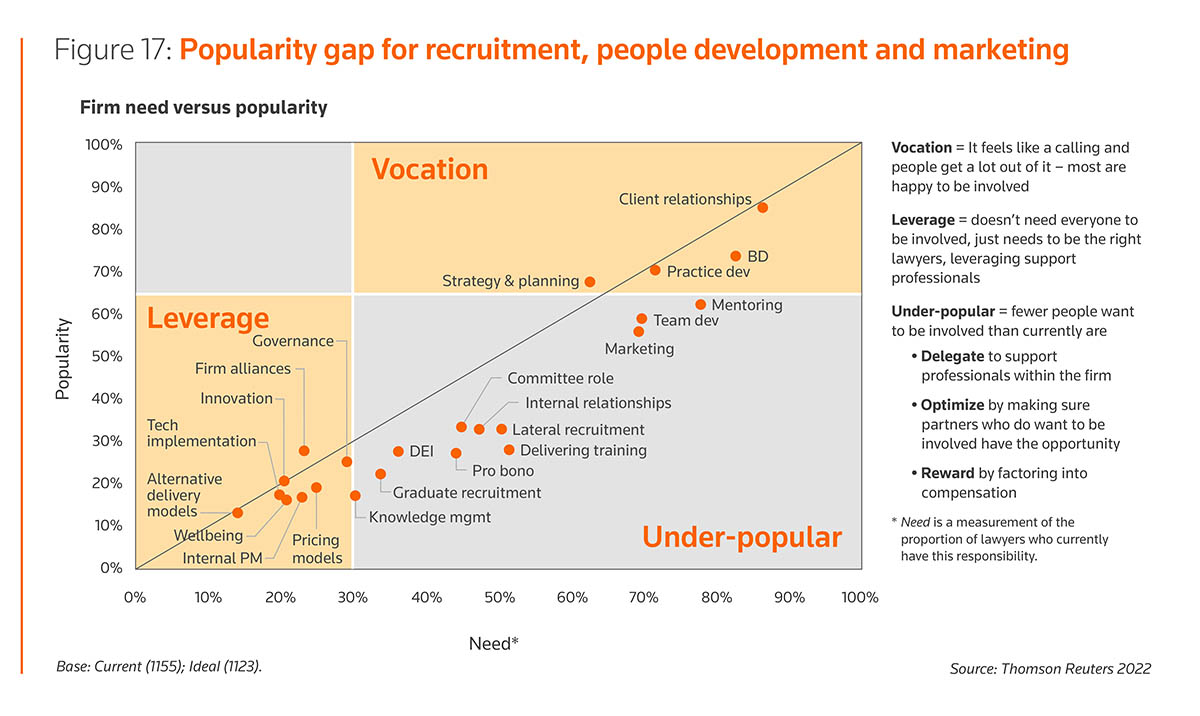For as long as anyone could remember, it seemed that the biggest fight a law firm had outside the courtroom centered on winning and retaining profitable clients. More recently, however, another even more pressing battle has emerged. The battle for talent.
Exacerbated by the “Great Resignation” and people’s desire to do work that truly fulfills them, law firms are finding that they frequently need to sell prospective hires on the firm as much as they would a prospective client. Not only that, they often have to work just as hard to keep quality talent as they do to keep their best clients.
In order to be competitive in the battle for talent, firms need to understand what makes lawyers tick. What excites them? What are they passionate about?
While any lawyer should know that success or failure will be based on billable hours and other agreed-upon metrics, there are other facets to the job. There is an outdated yet persistent notion among law firms that non-billable time is always non-profitable time. Clearly, the best lawyers feel passionate about things the firm wants them to do. But, firms need to understand that there is value in much of the non-billable activity that inspires many lawyers.
Lawyers want to be excited about every aspect of their work. And law firms must be able to tap into the things that their attorneys want to do with their non-billable time. This is one area where many law firms come up short in their efforts to explain their culture and the opportunity that exists for a new associate or lateral hire.
Aligning firm culture with lawyer preferences
Data from the recently published Stellar Performance Skills and Progression Mid-Year Survey 2021 from Thomson Reuters indicates that business-building activities may be where most lawyers want to spend their non-billable time. The graphic below from the survey shows that, for most lawyers, their passion lies in developing client relationships and building business.

If we look at the responsibilities highlighted in the “vocation” box, we can see that these are functions that primarily focus on growing the firm. We can think of the “vocational” responsibilities as things that lawyers might be drawn to as a sort of calling. These are things they want to do and find fulfilling. The people who excel at these responsibilities tend to be the rainmakers at the firm.
The “leverage” responsibilities, on the other hand, tend to be more strategic and logistical. As noted in the graphic, these responsibilities don’t need to have a large number of people involved. They just need a handful of focused, motivated legal professionals (not just lawyers) who can get things done.
When successfully fulfilled, these responsibilities can pay huge dividends for the firm and everyone in it. In addition, this type of collaborative, cross-functional approach can make this potentially less fulfilling work more engaging for the lawyers.
These are two very distinct skill sets that are of equal importance to a law firm’s success. When firms listen to their lawyers and make a point of giving them work that feeds their passions, the lawyers are more productive, happier, and more likely to stay with the firm long-term.
The survey data clearly shows lawyers’ preference for the vocational responsibilities along with the critical nature of the leverage ones. Smart firms will find a balance between the necessary work around the leverage-related tasks and providing meaningful opportunities to dig into the vocation-related work that lawyers find so fulfilling.
Learn more about what drives attorneys
Hiring and retaining top talent is likely to remain a top concern for law firms throughout 2022. Join Thomson Reuters webcast, “Stop the Great Resignation: Strategies for Reducing Law Firm Turnover,” to learn more about what you can do to make your firm an attractive employer in a tough talent market. Register today.






